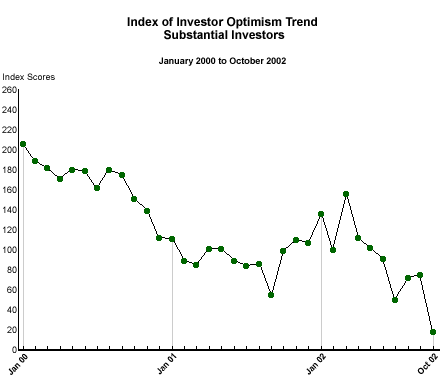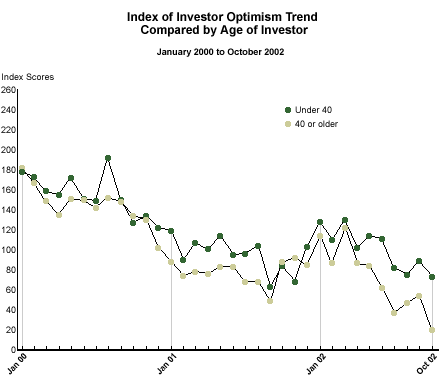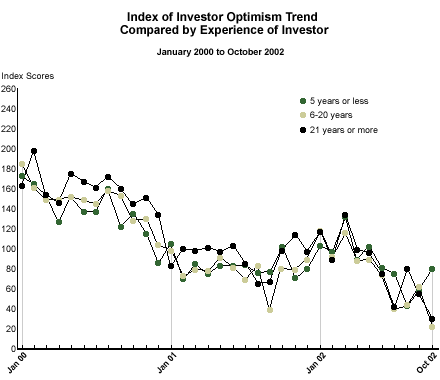Investor optimism has been steadily declining for most of the past three years. In October, it plunged to a new low according to the Index of Investor Optimism* -- a joint effort of UBS and The Gallup Organization. The overall Index is now at 29 -- its lowest point since its inception in October 1996.
Perhaps even more significant is the finding that optimism plummeted among all key investor groups in October.
- The overall Index among "substantial" investors -- those investors with $100,000 or more of investable assets -- reached a new, all-time low of 17.
- The overall Index among older investors -- those aged 40 and older -- also hit a new low of 19.
- The overall Index fell to a new low of 21 among investors with six to 20 years of investing experience, while it reached a new low of 29 among investors with 21 or more years of investing experience.
Only among younger investors (those younger than age 40) and newer investors (those with five years or less of investing experience) did the overall Index avoid falling to new lows during October.
Optimism Plunges Among Substantial Investors…
Overall optimism among substantial investors reached 205 in January 2000 and declined steadily the following year, reaching 110 in January 2001, and 54 in September 2001. Benefiting from the Sept.11 "rally effect," substantial investor optimism increased during late 2001 and early 2002. It reached 155 in March 2002, but fell again to a new, six-year low of 49 in July 2002. After a brief increase in August and September 2002, the substantial investor Index plunged to a new low of 17 in October.
Substantial investor optimism also decreased in October along both the Personal and the Economic Dimensions of the Index. The Personal Dimension decreased 18 points from 56 in September to 38 this month. The Economic Dimension decreased 39 points from 18 in September to -21 in October.

…As It Does Among Older Investors
In October, the overall Index for investors aged 40 and older hit a new low of 19 -- down 34 points from September. The Index among older investors is now substantially below its previous all-time low of 36 from July 2002.
In sharp contrast, the Index for investors under 40 was at 72 in October -- down from 88 in September but still well above its September 2001 low of 62.

Experienced Investors Are Also Less Optimistic
In October, the overall Index for investors with 21 or more years of experience investing reached a new low of 29, down 25 points from its September level of 54, and below its previously unprecedented July 2002 low of 41.
Similarly, the overall Index for investors with six to 20 years experience hit a new low of 21 in October, down 40 points from last month. This Index also beats the previous record low for this group (38 in September 2001).
The Index for investors with five years or less experience investing reached 79 in October -- up from 58 in September.

Key Points
The overall Index of Investor Optimism fell from 178 in January of 2000 to 76 in September 2001. The Sept. 11 attacks and the rally effect that followed interrupted this trend. Investor optimism fell to artificially low levels in September 2001 and rebounded to artificially high levels in 2002. In this regard, the rally effect illustrates of the role emotion can play in the national economy.
By July 2002, the impact of the rally effect on the economy had fully dissipated. Investor optimism and many other economic indicators seem to have returned to their long-term downward trend of the past three years. In essence, the economy continues to deflate the huge economic bubble that developed as the last century came to a close.
What can jolt the U.S. economy out of this long-term cyclical downturn in 2003? It's possible that after the elections, the Fed will further ease monetary policy and Congress will act to provide a significant fiscal stimulus. Another possibility is that the United States will win a quick and decisive war in Iraq. Removing the pressure of war-related risk premiums from the markets would provide a significant economic stimulus.
Unfortunately, while some risk-taking equity investors may want to bet on these possibilities in the near term, it's not a good idea for more general business or personal planning. History suggests that economic stagnation is rarely sufficient reason for policy-makers to take strong actions to stimulate the economy. In other words, it's likely that the economy is going to get worse before it gets better.
*Results are based on telephone interviews with 1,001 investors, aged 18 and older, conducted Oct. 1-17, 2002. For results based on the total sample of investors, one can say with 95% confidence that the margin of sampling error is ±3%.

